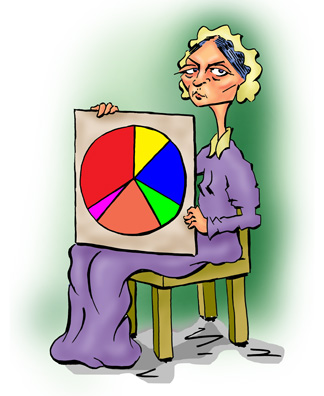Florence Nightingale
She didn't invent it.

You learned from the celebrity/panel show Qi, that Florence Nightingale - most famous for caring for the wounded during the Crimean War, also invented the pie chart. This, though, is - although Quite Interesting - it's not Quite True. Yes, Florence was a mathematical savvy lady who used a pie chart to illustrate the causes of death in the army. But the invention of the pie chart is credited to William Playfair, a pioneering statistician who had first used a pie chart to show the division of the Ottoman Empire by continent. That was in 1801, and when William died in 1823, Florence was only three years old.
But one thing that William Playfair did not do was after becoming a nurse for the wounded during the Crimean War was reduce mortality in the hospitals from 40% to 2%. That's what Florence did.
The Crimean War was fought from 1853 to 1856. This, of course, was a day before people new anything about germs and bacteria. Hospitals in general and battlefield hospitals in particular were mostly places where people went to die.
But when Florence arrived at the hospital at Scutari (across the straight from Constantinople), she made sure that the hospital got cleaned up. She also provided help for the men in writing letters to home, making sure they got better food, and just cheered them up. The improvement in the recovery of the wounded was so dramatic that when Florence returned to England she was hailed as a hero.
Florence also helped raise up the status of the profession of nursing. At the time, nurses were generally poorly trained and the subject to leers and jeers and discourteous jokes. It was Florence's success that reversed this image and made nursing one of the respectable professions for young women.
The Crimean War was one of those wars that really had no reason to start. Briefly it was because the various superpowers - Russia, England, and the Ottoman Empire (Turkey) wanted control over parts of the Middle East. But things started off when Russia moved into regions on the present day Romanian border that Turkey claimed as their own. Turkey declared war on Russia and Britain joined Turkey.
The war really had no purpose and about the only thing it did was give Alfred, Lord Tennyson, the opportunity to write The Charge of the Light Brigade about the Battle of Balaclava on the north shore of the Crimean peninsula of southern Russia.
Florence was born on May 12, 1820 and her parents were rich. Much to their consternation, Florence didn't want to get married to some even wealthier beau, but wanted to help suffering humanity. Evidently recognizing their daughter was a headstrong young lady, they eventually acquiesced and Florence studied nursing at Institution of Protestant Deaconesses at Kaiserswerth, Germany. She had a total of less than four months training, but that was actually more than a lot of nurses got at the time.
Because Florence and her group of nurses were to some degree wished upon the field hospitals, there was initial resentment to her presence. However, the fact she improved the recovery rates was clear and she soon
Of course, we read that Florence's contributions were overblown but that's the Assistant Professor's Syndrome at work.
After the war, Florence returned home and with private funding was able to establish a school for nursing. This She was also largely responsible for much public health legislation of the mid-1870's.
This is all the more remarkable since for about 10 years from 1857 she was confined almost continuously to her bed with some debilitating illness. You may read this was a most loathsome disease, of which she eventually died. As much as people who can't stand goody-two shoes high achievers like to revel in schadenfreude, alas, that's not what she died of. Hugh Small, who wrote a number of books about Florence, said he heard the rumors started because a religious leader claimed Florence contracted the disease but that was because she was an atheist who did not deserve the accolades that had been heaped on her. Actually Florence was a Unitarian and died of old age in 1910 when was 90.
References
The Life and Letters of Florence Nightingale, Reynolds-Findley Historical Library, University of Alabama at Birmingham
"William Playfair and His Graphical Inventions: An Excerpt From the Introduction to the Republication of His Atlas and Statistical Breviary", Ian Spence and Howard Wainer, The American Statistician August 1, 2005, 59(3): 224-229. William's book, Playfair's Commercial and Political Atlas and Statistical Breviary, is available from Cambridge University Press.
"Florence Nightingale: New biography from Hugh Small", Insights in Social History, Books and Research by Hugh Small, 2017.